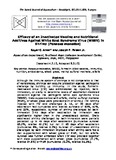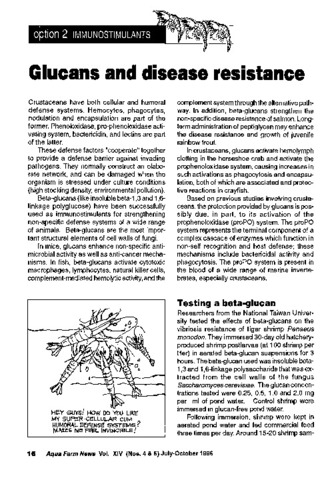Induction of immunity and resistance to white spot syndrome virus (WSSV) in shrimp Penaeus monodon (Fabricius) by synthetic oligodeoxynucleotide and bacterial DNA
- Global styles
- MLA
- Vancouver
- Elsevier - Harvard
- APA
- Help

View/
Date
2012Page views
2,675ASFA keyword
AGROVOC keyword
Taxonomic term
Metadata
Perlihat publikasi penuh
Share
Abstract
Shrimps like all invertebrates are believed to lack true adaptive immunity but recent evidence indicate that they can be protected against pathogenic organisms by priming their immune system with immunostimulatory substances. Here, we describe results of investigation aimed to strengthen shrimp immunity as a preventive strategy against white spot syndrome virus (WSSV) infection. Oligodeoxynucleotides (ODNs) with and without Cytosine-Guanine (CpG) motifs, and Vibrio harveyi genomic DNA (VHD) were administered by intramuscular injection and shrimp responses were assessed by ex vivo assays and experimental infection trials. Results showed that CpG ODN significantly increased ex-vivo immunity indices such as total hemocyte count (THC), plasma agglutination titer (PAT) and hemocyte lysate agglutination titer (HLAT). VHD significantly increased immune indices such as THC, plasma total protein (PTP) and HLAT. Reverse (GpC) motifs increased THC only. At a lower viral challenge dose, both CpG and GpC motifs, and VHD, were able to reduce shrimp mortality significantly but only CpG and VHD did so at a higher challenge dose. Strengthening shrimp immunity by the use of immunostimulatory nucleotides and bacterial genomic DNA could be a feasible preventive approach in the management of WSSV infections in shrimp.
Suggested Citation
Amar, E. C., & Faisan, J. P., Jr. (2012). Induction of immunity and resistance to white spot syndrome virus (WSSV) in shrimp Penaeus monodon (Fabricius) by synthetic oligodeoxynucleotide and bacterial DNA. Philippine Agricultural Scientist , 95(3), 267-277. http://hdl.handle.net/10862/2173
Type
ArticleISSN
0031-7454Koleksi
- Journal Articles [1261]
Related items
Showing items related by title, author, creator and subject.
-
Evaluation of dietary freeze-dried Chaetoceros calcitrans supplementation to control Vibrio harveyi infection on Penaeus monodon juvenile
Seraspe, Ebonia B.; Gabotero, Shirleny; de la Peña, Milagros R.; Pahila, Ida G.; Amar, Edgar (Elsevier, 2014)
Effects of supplementation of diets with freeze-dried Chaetoceros calcitrans to control Vibrio harveyi infection are evaluated through immune responses, and disease resistance of juvenile Penaeus monodon. Total lipid and ...
(Elsevier, 2014)
Effects of supplementation of diets with freeze-dried Chaetoceros calcitrans to control Vibrio harveyi infection are evaluated through immune responses, and disease resistance of juvenile Penaeus monodon. Total lipid and ... -
Efficacy of an inactivated vaccine and nutritional additives against white spot syndrome virus (WSSV) in shrimp (Penaeus monodon)
Although the immune system of shrimps is not comparable to that of vertebrates, shrimps can acquire protection against pathogenic challenge by building up immunity. In this study, formalin-inactivated virus (FIV) was ... -
Glucans and disease resistance
Southeast Asian Fisheries Development Center, Aquaculture Department (Aquaculture Department, Southeast Asian Fisheries Development Center, 1996)The paper presents the usefulness of beta-glucans as immunostimulants for strengthening the non-specific defense system of a wide range of animals. In Taiwan, researchers tested the effects of beta-glucans on the vibriosis ...





